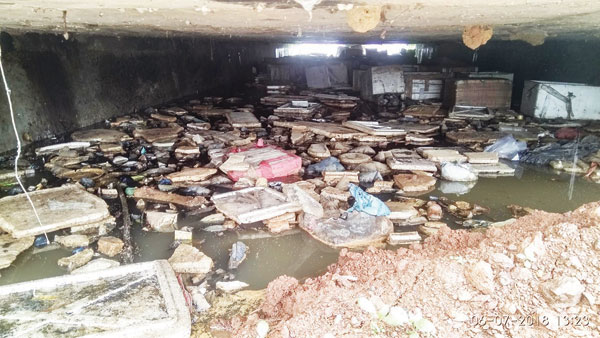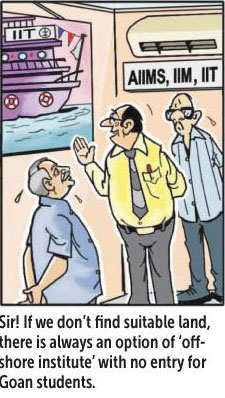18 Jul 2018 | 04:39am IST
BEYOND FORMALIN, MADEL FISHMART FACES BIOHAZARD BOMB
Bad Planning, Bad Management, Bad Waste Disposal makes Wholesale Fish Market unhealthy, SGPDA, the custodian of WFM washes hands of its responsibility of upkeep
Avinash Tavares
Madel: Even as the Formalin controversy that hit Madel’s whole sale fish market refuses to die down, a new menace has been lurking around for a much longer time. As debates rage and demands made for Food and Drugs Administration authorities to set up monitoring mechanisms to regularly check the fish for chemical contamination, an equally hazardous form of contamination goes undetected and unchecked – of biological contamination.
In the aftermath of l’affaire formalin, the Herald went deep into ground zero and discovered a shocking trail of unhygienic surroundings and biohazardous environment at Goa's Biggest Wholesale Fish Market that supplies fishes to all major towns and villages across the State.
The wholesale fish market is an open ground where fish is unloaded from nearly 100 interstate trucks and sold to local vendors daily. Herald visited the fish market last week and made some observation that range from unpleasant to shocking.
The truck drivers didn’t have any documents to show that the ice used to store the fish was hygienic. Sources in the fish trade have long suspected that the ice used in these trucks is industrial ice.
The melting ice from the trucks is discharged into a drain around the central platform of the market. This water, that resembles leachate, flows from this drain into the storm drain that runs along the southern wall of the market and eventually into the river Sal nearby. This wastewater is a magnet for flies.
Many of the trucks do not use the drain to discharge their wastewater. Herald observed that the wastewater is discharged on the tarmac inside the market. Besides flies, there are thousands of mosquitoes floating over the puddles of this water.
Everywhere you look, Styrofoam boxes litter the area. These boxes are around 2 feet wide and a foot in breadth and height with a thickness of more than 2 inches. There is an area that appears to be the designated spot at the northern boundary of the market, for dumping the Styrofoam. However, the broken boxes are scattered all over the market area.
Most of these bits end up in the River Sal. The Fatorda-Seraulim road which runs along the southern side of the market has a culvert west of the main gate of the market. Herald inspected the culvert underneath and was shocked to that the culvert was chocked with Styrofoam waste. Obviously, the Styrofoam had over a period of time, floated from the wholesale fish market under the culvert and accumulated thus constricting the flow of water.
The foul stench of the fish market spreads across the entire Madel ward and surrounding areas of Fatorda. Even though the district collectorate is across the main road, the officials have been turning a blind eye to this issue.
Odour is another form of pollution that can be annoying and can cause somatic symptoms such as headaches, nausea and shortness of breath. In May 2009, the Central Pollution Control Board had published a document titled “Guidelines on Odour Pollution and its control”. This comprehensive document details the procedure for measuring odour pollution, the methods and the technologies for controlling odour.
In 2016, United Goans Foundation, an NGO based in Fatorda had requested the Goa Pollution Control Board to enforce these guidelines however, the authorities are yet to act.
During the heavy rainfall in the first week of July, many parts of Fatorda was flooded and the wholesale fish market was no exception. The land between the fish market and the river sal which was recently filled up to make space for parking trucks was inundated with water.
The flooding occurred primarily because the stretch of river Sal which flows along the western boundary of the fish market is completely chocked with water hyacinth. The river hasn’t been cleaned over the last many years. Instead, the land between the river and the current fish market has been filled with mud to increase the area for parking the fish trucks. A small structure has also been built in that area. Sources in the SGPDA claim that no permission was taken for land filling and for the construction of this structure.
Should the government be investing Rs 13 cr at this site? The land on which the wholesale market operates is under the SGPDA. However, the SGPDA has no staff deputed at the site to monitor the day to day operations. The entire show is run by the contractor appointed by the SGPDA.
Recently the government had announced a Rs. +13 Crore proposal for upgrading the fish market. However, the plans are yet to be made public. Just last year, a boundary wall was constructed around the market. With nearly 100 interstate trucks and more than 1000 vehicles entering and leaving every day, the current location is not suited for this purpose, especially given that the KTC Bus terminus cum commercial complex is also in the pipeline.
There were attempts made to shift the fish market to the Verna Industrial estate, given the centralised location, the space available for expansion and distance from populated areas. However, the proposal had been shelved.
The Herald spoke to the Member Secretary of the SGPDA regarding the issue of hygiene at the market. He said that the new wholesale fish market proposal is at its final stage and will be tendered soon. “When the new market comes, that problem won’t occur”, he said. However, with regards to the current state of affairs, he pushed the buck on the contractor claiming that the contractor is looking after it as the SGPDA does not have any staff on the site.
Herald also showed the photos of the wholesale fish market garbage which was dumped opposite the road in front of the market. The Member Secretary responded by stating that the area comes under the Municipal jurisdiction and therefore they should take care of it.

